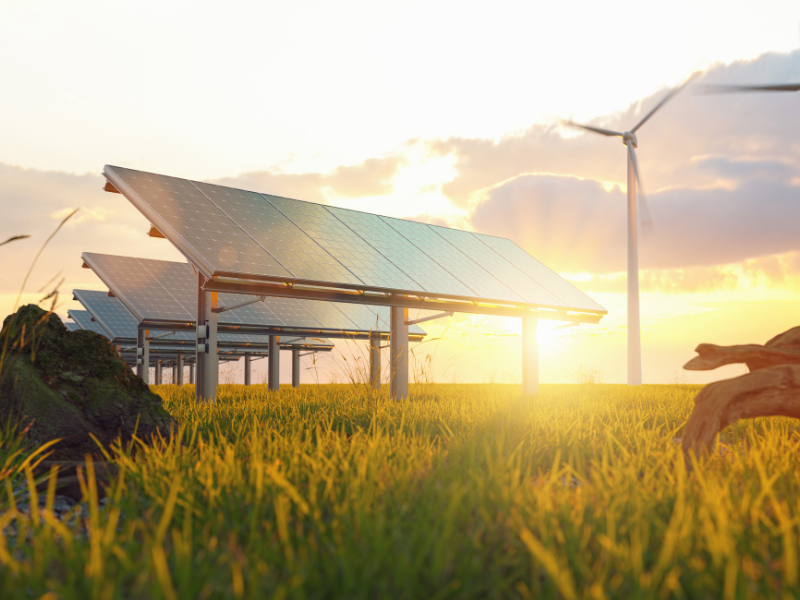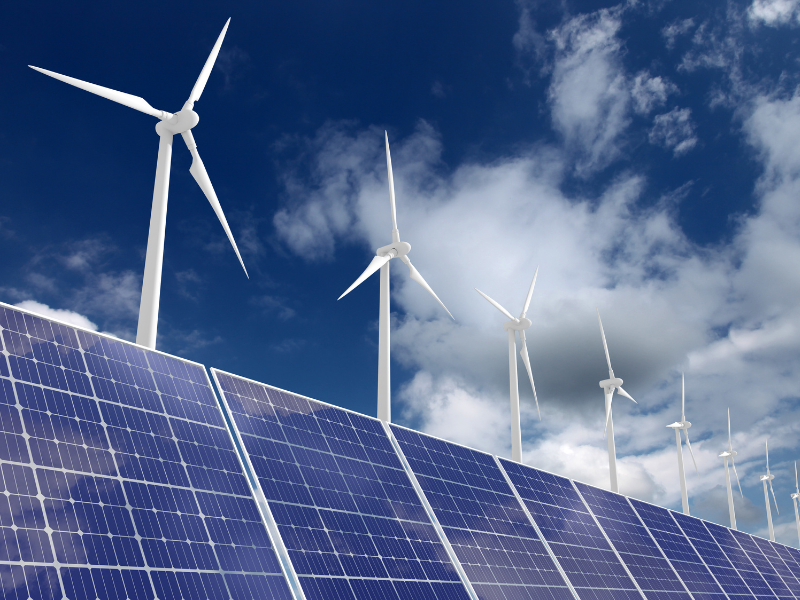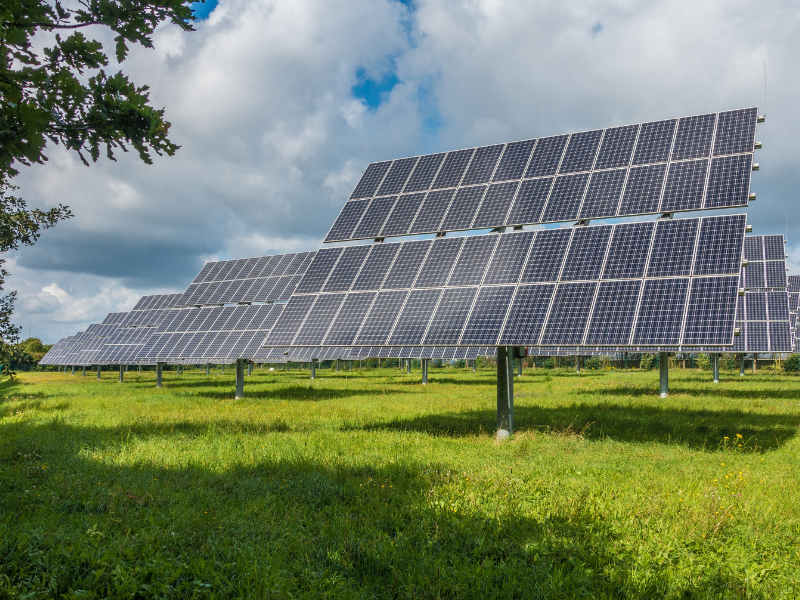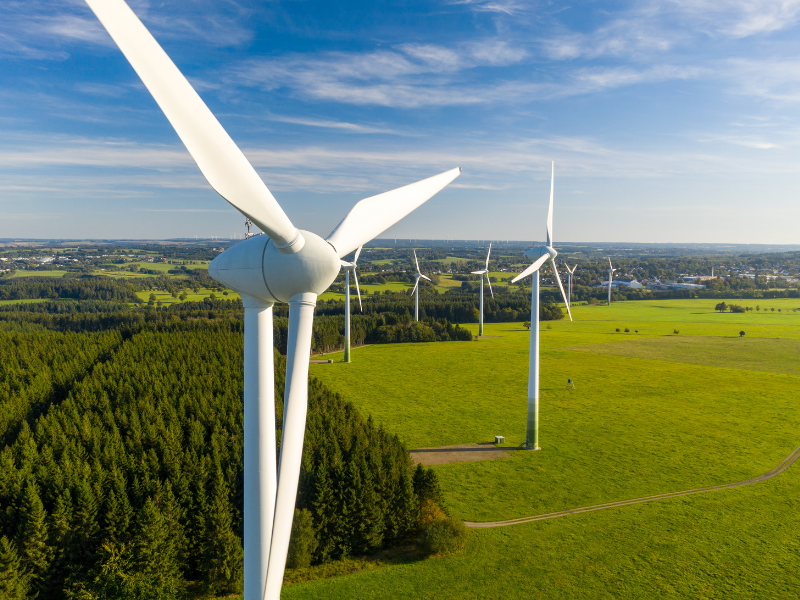Introduction

In recent years, there has been a significant shift towards renewable energy sources as the world seeks to address the challenges of climate change and fossil fuel depletion. Renewable energy, such as solar, wind, hydro, and geothermal power, offers not only environmental benefits but also substantial economic advantages. This article explores the many economic benefits of renewable energy and its potential to revolutionize the global energy sector.
Economic Advantages of Renewable Energy

Renewable energy technologies have various economic advantages that make them attractive investments for both governments and businesses. Let’s delve deeper into the economic advantages of renewable energy and understand how they contribute to a more sustainable future.
Cost Effectiveness: Saving Money while Saving the Planet
Renewable energy sources are becoming increasingly cost-effective, with falling prices of solar panels, wind turbines, and other infrastructure. By harnessing the power of the sun, wind, or water, renewable energy projects can generate electricity without expensive fuel inputs. This significantly reduces the operational costs of energy production, leading to lower electricity prices for consumers in the long run.
Moreover, investing in renewable energy can shield countries from volatile fossil fuel prices. As oil and gas prices fluctuate, renewable energy projects provide a stable and predictable source of power, reducing reliance on imported fossil fuels. This energy independence can enhance a nation’s economic security and protect it from unstable global energy markets.
Job Creation and Economic Growth
The renewable energy sector has the potential to create millions of jobs globally. According to a study by the International Renewable Energy Agency (IRENA), the renewable energy industry employed over 11.5 million people worldwide in 2019 and is projected to reach 42 million jobs by 2050. This rapid growth in green jobs will not only provide employment opportunities but also stimulate economic growth and development.
Investments in renewable energy projects generate a positive ripple effect throughout the economy. They require skilled labor for design, construction, and maintenance, indirectly benefiting sectors such as manufacturing, engineering, and transportation. Furthermore, renewable energy projects often prioritize local hiring and procurement, injecting economic vitality into communities.
Energy Cost Stability: Hedging against Price Volatility
One of the major advantages of renewable energy is its stability in terms of cost. The cost of producing renewable energy does not rely on fluctuating fuel prices, unlike traditional fossil fuel-based power generation. This stability allows consumers to accurately predict their energy costs, empowering individuals, businesses, and governments to plan their budgets more effectively.
Moreover, renewable energy systems, such as solar panels, can generate power on-site, reducing the need for long-distance transmission and potential transmission losses. This decentralized generation model can further stabilize electricity costs by reducing transmission and distribution charges, benefiting both residential and commercial consumers.
Public Health and Environmental Savings
Renewable energy forms play a crucial role in mitigating the harmful effects of conventional fossil fuel usage on public health and the environment. Burning fossil fuels releases greenhouse gases, contributing to climate change and air pollution. The combustion of coal, oil, and gas emits pollutants such as sulfur dioxide, nitrogen oxides, and particulate matter, which have detrimental effects on human health.
By transitioning to renewable energy, societies can significantly improve air quality and reduce the incidence of respiratory diseases, cardiovascular ailments, and other health issues associated with pollution. The economic advantages of renewable energy extend beyond financial savings; they also encompass immense cost savings on healthcare expenditures and increased productivity due to a healthier workforce.
Empowering Local Economies and Communities
Renewable energy projects often empower local economies and communities by driving investment, encouraging entrepreneurship, and promoting the localized use of resources. Small-scale renewable energy initiatives, such as community-owned solar farms or wind co-operatives, allow individuals, businesses, and communities to participate actively in the energy transition.
Communities can not only generate their own power but also sell the excess electricity back to the grid, creating a new revenue stream. This stimulates local entrepreneurship, job creation, and economic growth. Additionally, investing in renewable energy projects can enhance energy security at the local level, reducing vulnerability to grid failures and other disruptions.
Long-Term Cost Savings and Return on Investment
Renewable energy projects require an initial investment but often provide substantial long-term cost savings. Solar panels and wind turbines have a long operational lifespan, typically ranging from 20 to 30 years or more. Once the initial investment is recovered, the electricity generated becomes virtually free, resulting in significant cost savings over the project’s lifetime.
Furthermore, governments and businesses can benefit from renewable energy incentives and subsidies offered by various nations and international organizations. These financial incentives, coupled with the declining cost of renewable technologies, enhance the return on investment (ROI) for renewable energy projects. As the global economy increasingly recognizes the urgency of addressing climate change, governments and organizations are expected to enhance support for renewable energy initiatives, making them even more financially attractive.
FAQs (Frequently Asked Questions)

Q: What are the economic advantages of renewable energy?
Renewable energy offers numerous economic advantages, including cost-effectiveness, job creation, energy cost stability, public health savings, empowering local economies, and long-term cost savings.
Q: How does renewable energy contribute to job creation?
The renewable energy sector is a significant job creator, providing employment opportunities for millions of people globally. Investments in renewable energy projects stimulate economic growth and support sectors like manufacturing, engineering, and transportation.
Q: Can renewable energy help stabilize electricity costs?
Yes, renewable energy sources, such as solar and wind power, provide stability in terms of energy costs. As the cost of production does not depend on fluctuating fuel prices, consumers can accurately predict their energy expenses and plan their budgets more effectively.
Q: How does renewable energy benefit public health and the environment?
Renewable energy plays a crucial role in mitigating air pollution and reducing greenhouse gas emissions, contributing to better public health and a cleaner environment. The transition to renewable energy sources significantly improves air quality and reduces the incidence of respiratory and cardiovascular diseases.
Conclusion

The economic advantages of renewable energy are leading the world towards a more sustainable and prosperous future. From cost-effectiveness and job creation to energy cost stability and public health savings, renewable energy offers a multitude of benefits for individuals, businesses, and nations alike. As we harness the power of renewable energy sources, we not only address climate change but also create economic opportunities and build resilient communities. It is clear that investing in renewable energy is not only a smart choice for environmental sustainability but also for long-term economic prosperity.

